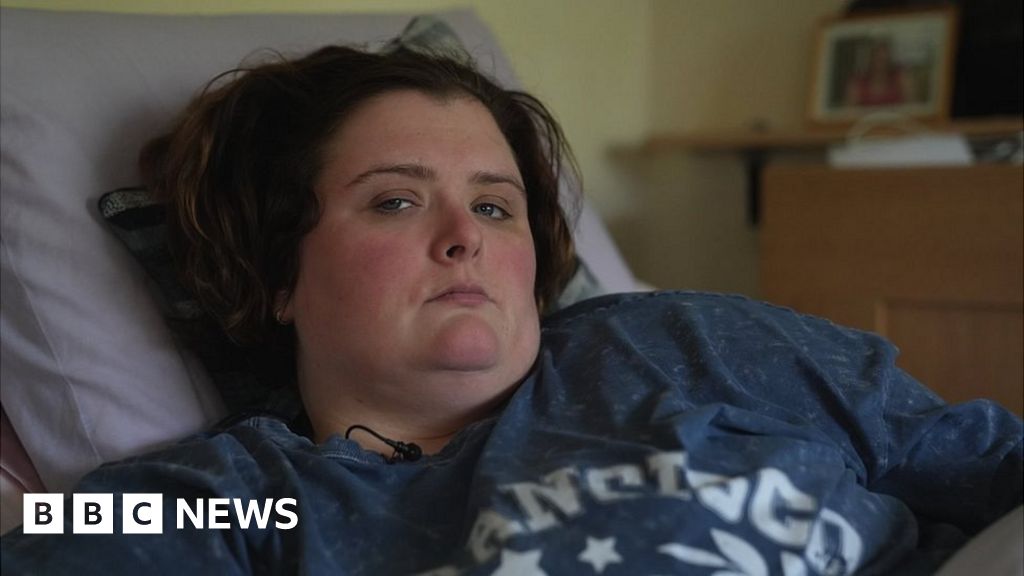- By Nikki Fox and Charlie Jones
- BBC East
source of images, John Fairhall/BBC
Daisy Simpson has been confined to her room for two years
People living with rare diseases often cannot live their full lives because they receive inconsistent care, a charity warns.
Daisy Simpson knows this all too well. She suffers from 17 different health conditions, including Moyamoya disease, which affects only one in a million people.
The 34-year-old from Brentwood, Essex dreamed of becoming an actress when she was growing up, but her reality couldn’t be more different.
Daisy has been confined to her room for over two years due to problems finding suitable accommodation.
She was diagnosed with the condition, which fuses blood vessels in the brain, at Addenbrooke’s Hospital in Cambridge after suffering a stroke and brain haemorrhage in January 2021.
source of images, daisy simpson
Daisy hoped to have an acting career before her health deteriorated
“Before this all went wrong, I was doing theater and acting. I never thought, in my wildest fears, it would be this bad,” she says.
Doctors say brain surgery could potentially prolong her life, but she would only have a 50/50 chance of surviving the operation. Without it, she estimates that she has less than five years to live.
Instead of being able to enjoy this moment, Daisy is stuck in her room because her wheelchair won’t fit through her apartment doors.
She can’t get to the bathroom unless carers get her across using an office chair, leaving her “desperate”.
source of images, John Fairhall/BBC
Daisy can only leave her room when a carer can move her to an office chair and roll her
“I feel dehumanized, I feel degraded, I have to have intimate care in a setting where there is no privacy. I was made to feel like I didn’t matter and I feel angry that I was left like this,” she said. said.
“I can’t have independence. By the time I move, it could take another year and that possibility of independence will be gone. It’s soul destroying.”
Daisy has been waiting for a suitable home for two years.
Brentwood Council says it has identified a property, but it requires significant work to meet its needs.
“The housing situation is stealing my life. We know I don’t have much left and being stuck in this room every day is horrible,” she says.
The council says it is working with several agencies to provide the best possible support and that officers are looking for a suitable temporary home for Daisy while work is underway.
“Nationally there is a lack of social housing, particularly housing for people with disabilities,” said a spokesperson, adding that the council was trying to improve provisions in the borough by building new new social housing.
source of images, John Fairhall/BBC
Daisy would be stuck in bed without family friend Brian caring for her
Along with her battle to get more suitable housing, Daisy says she needs to act as a project manager for her health.
In addition to Moyamoya’s disease, which puts her at enormous risk of further strokes, she suffers from a respiratory condition which can make it hard to breathe, an intestinal disorder and type 1 diabetes. 1.
Daisy is cared for by more than 50 different healthcare professionals from seven different hospitals and community teams across England, with no central point of contact for her care.
“Things go unnoticed and it’s chaotic. People with rare diseases need a rare disease coordinator, but I don’t have one,” she says.
Louise Fish, chief executive of the charity Genetic Alliance UK, says it’s a common problem for people with rare diseases and that good coordination of care can be ‘transformative’ when it happens. product.
“Rare diseases are often complex and lifelong and people living with rare diseases and their families need joint care from a range of services and healthcare professionals to help them live their full life. life.
“Unfortunately, only four in 10 children and one in 10 adults living with rare diseases have a care plan outlining how their care will be coordinated,” she says.
Daisy struggles to hold on to the caregivers as they have to sleep on a trundle bed in the living room.
There are also particular problems in finding caregivers skilled enough to deal with her complex needs.
She relies on friends who are now paid to look after her, including family friend Brian Kerr.
source of images, John Fairhall/BBC
Family friend Brian Kerr acts as carer for Daisy but finds it distressing to see how her health has deteriorated
“I watched Daisy go from being a very active teenager to the state she is in now, where she is totally unable to do things on her own,” he says.
“It’s distressing. I’m trying to do everything I can to help but without professional services acting as they should, there’s not much you can do.”
The Mid and South Essex Integrated Care Board is responsible for Daisy’s care. It says Daisy receives a personal health budget which funds carers to provide her with “a significant level of support”.
“The local NHS continues to support Daisy to ensure she has a care package that meets her needs. The recruitment and employment of a care coordinator can be supported by the local NHS, but the final decision would rest with the patient,” added a spokesperson.
He added that he hoped a date for system-wide multidisciplinary meetings could be agreed soon.
Daisy thinks the stress of her current situation is unmanageable and she hopes to be able to spend some of her remaining time in a home that gives her more independence and privacy.
“Even though there are budget cuts and things are stretched, humanity costs nothing. I don’t feel supported. I don’t feel protected. I don’t feel like a person anymore,” she adds.
